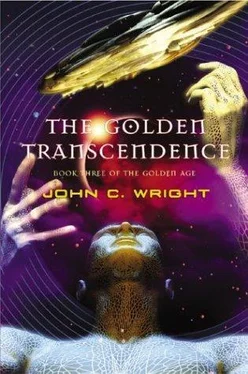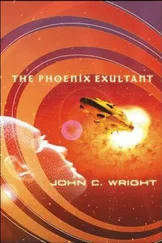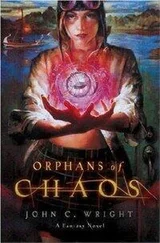During the little Transcendence in Jupiter, Gannis threw more than one fortune away, trying to maintain, by himself, the type of infrastructure and thought-speeds necessary to reach Transcendent thoughtspace.
He looked for a solution. He sought a future where his daughter could be saved.
And he found a copy of Ungannis still in the circuits of Io, still lingering in the Transcendence. She was staring in disbelief, running over and over again, a certain extrapolation that predicted the reaction for her gallows speech.
The fiery death-speech she thought would shock the Golden Oecumene to its foundations elicited little more than cool mockery, perhaps a touch of faint contempt.
Gannis came flooding through the wires, bringing the little Transcendence with him. It only lasted a second or two-even he, with all his wealth, could not maintain such a sustained effort for long-but during that second, his daughter had a moment to think.
And to think with all the brain power of millions helping her.
The option was still open to her that, instead of fleeing, her memories could be preserved inside a person, somewhat like herself, but without her fixed values. The change would be so radical that the Curia would consider her, legally, to be a different person. She would adopt the comforting belief that she was the same person. But one irony of this would be that she (a different legal person) would no longer be in line to be the heir of Gannis even if all of him should die. Her attempt at escape, her attempt to confound the morality of the Curia by presenting her captors with hundreds of innocent or repentant copies or herself, would not have to take place, if she chose that it would not.
It was not too late. Ungannis could choose another future than this one.
Would she?
And the little Transcendence refused to predict or decide that outcome.
AND AGES YET UNGUESSED COME
Helion was the last man on Earth to leave the High Transcendence. In it, he saw a vision of the future. His future. While it lasted, he was the center of attention, of controversy, of comment, of censure, of praise. It was his time.
During the High Transcendence, Helion was not aware of himself as his own person, any more than a man whose whole concentration is focused on some task of exacting skill, or on some sense-dissolving ecstasy, is self-aware. Instead, all the awareness of thought was composed of thought. And even in the same way as a work of art, or an excited conversation among close friends, can take on a life of itself, the thought of thought took on its own life. Helion's dream radiated out into the thoughtspace like the rays of a sun. He found his thoughts and half-thoughts picked up by others and completed, others whose thoughts, in turn, were fulfilled by others yet, reflected upon, brightened, polished, returned better than they left, the way responding planets, filled with life, send back then-bright reflections to the central sun, who, without those green planets, is barren himself.
Each participant was justly proud of his contribution to the overall result, no one able to claim credit for the whole, in the same way that a school of thought or a movement in the arts or sciences has no one author, but neither is the genius of the founders of that school obscured or made anonymous.
Within the vision, Helion, a thousand years from now, stood on the balconies of his Solar Array, housed in a body unimaginable to modern science, one in which the singularity science of the Second Oecumene could weave neutronium into his bones, and power bis nervous system from a heart like a black hole. In this time to come, the folded origami of space itself would be one more tool affecting the science, art, philosophy, of those few human-shaped beings left.
For in that age, a thousand years hence, with the war with the Second Oecumene still just beginning, Helion was among the few who could afford the affectation of continued human appearance. By the graceful standards of the modern age, that future time would be an age of lead, colorless and drab, with flamboyance and frivolity long dead, all sacrificed to the needs of war.
Necessity, grim necessity, would harass and haunt each step and thought of the citizens of the next Transcendence, to be held under the guidance of a Sophotech not yet designed, to be called, no doubt, Ferric Sophotech.
Helion stood and looked out upon the many parallel rows of supercolliders, hanging like bridges of gold, like highways of light, across the surface of the photosphere, the solar equator ringed not once, but many times, with machines of prodigious power, creating strips of golden adamantium.
Raising eyes equipped with senses not yet discovered, which could penetrate, by means of ghost-particle echoes, all opacities of darkness or of blinding light, Helion sent his gaze on high, and saw, towering infinitely above him, space-elevators, rising like beanstalks out from the unthinkable gravity of the sun, extending upward, endlessly, past the orbits that had once held Mercury and Venus. From the cities at the "tops" of those towers, more towers reached out, these made of energy, not neutronium, and ran entirely across the system. These rivers of light ran to positions in the ice belts and Oort clouds, where truly massive spheres, more than planets in diameter, housed Sophotechs of new design. These Sophotechs were utterly cold, constructed of subatomic particles held in superdense matrixes in vast blocks of "material" in the state of absolute zero temperature. Only this icy perfection was dense enough and rigid enough and predictable enough to house the new generation of thinking machines.
Along these towers was more surface area than the present of the whole Golden Oecumene. Land cubic was cheaper than air. The cores of the towers would contain Second Oecumene singularity fountains, so that energy was cheaper than either. Helion, looking up, was able to "see" the great vessels of gold, hundreds of kilometers in length, piloted by his further scions, braver versions of himself, Bellerophon and Icarus. The sons of Helion were eager to follow into the abyss of space their eldest brother, Phaethon, of whom no report had yet returned, for Phaethon maintained strict radio silence during his many long voyages.
The shining ships of the sons of Helion each held worlds in their memories, endless menageries, transcripts of all minds and souls of any in the Golden Oecumene who volunteered to be recorded. In this way. should enemy assault somehow elude the complex protections, and the Solar System be destroyed, the Golden Oecumene, as long as a single ship survived, would live again. And what Helion of that day and age used for eyes turned outward again, seeing distant stars and constellations, hearing the pulse of music, the mathematics of rational conversation, not from one, but from scores of worlds.
Some colonies were decoys, entire invented civilizations, dreamed to the last detail and nuance, but existing only in Sophotechnic imaginations. These were decoys meant only to lure Silent Oecumene soldiers down to worlds that seemed populated but which were, in fact, merely Atkins, Atkins in endless numbers, waiting with endless patience to destroy any who dared make war.
But other colonies were colonies in truth, called by fanciful names: the Silver Oecumene and the Quick-Silver, founded at Proxima and Wolf 359; and the Oecumenes of Bronze or Orachilcum near Tau Ceti; or the warlike Oecumene of Adamantium, circling the dragon star Sigma Draconis; and the Nighted Oecumene, founded by the Neptunians in the deep of space, far from any sun, but seething with activity, noise, and movement.
These colonies were those brave enough or foolish enough to taunt the Silent Lords, by revealing their locations in signs of fire, allowing to escape into the void the radio noise and activities of industry, of planetary engineering, and the establishment of further Solar.
Читать дальше










